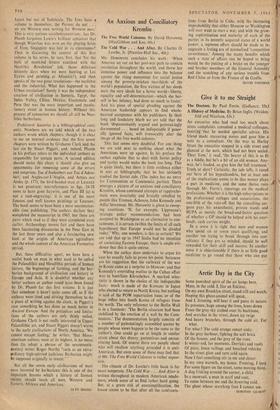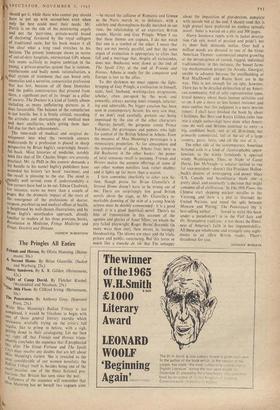Give it to me Straight
AN executive who had read too much about stress complaints consulted a medical colleague, insisting that he needed specialist advice. His friend made reassuring noises and gave him a note to a consultant. On the way to Harley Street the executive stopped in a side street and glanced at the note, which had not been sealed. `Dear Tom,' it read, 'the bearer of this is as fit as a fiddle, but he's a bit of an old woman. Any- way, he's loaded, so give him the full treatment.' Truth or dare? Certainly, the tale tells, it cured our hero of his hypochondria, but at least one of the implications seems to be that money plays a part in medicine, and the same theme runs through Mr. Ferris's reportage on the medical professions. Whether it is the high subscriptions to the professional colleges and associations, the one-fifth of the rake-off that the consulting sur- geon pays his anaesthetist, private wards and BUPA or merely the bread-and-butter question of whether a GP should be helped with his over- heads, cash carries weight.
In a sense it is right that men and women who spend six or seven years qualifying, and another ten trying to break' through into con- sultancy if they are so minded, should be well rewarded for their skill and success. In another sense it is objectionable if there is so little good medicine to go round that those who can pay
should get it, while those who cannot pay should have to put up with second-best even when only the best could meet their needs. Mr. Ferris is on the side of the ministering angels and not the 'part-time, private-world brand of doctoring' favoured by the royal collegers of traditional caste, but his book makes it all to clear what a long road stretches to his horizon. The present landscape shows us scores of out-of-date hospitals, overworked GPs whose fate seems unlikely to inspire ambition in the Young, a private-practice system that is random, cumbersome and badly needs rationalisation, a Ai dual system of treatment that can breed only anomalies and a secretive, conservative profession that has lost, because of all these blemishes and the public controversies that proceed from them, a significant part of its 'image' as a pillar of society. The Doctors is a kind of family album Including as many unflattering pictures as it does favourable. The balance of the compilation Is not hostile, but it is firmly critical, recording the attitudes and shortcomings of medical men and their ancillaries, while giving them their full due for, their achievements.
The time-scale of medical and surgical de- velopment into what the twentieth century understands by a profession is placed in sharp Perspective by Brian Inglis's surprisingly beauti- ful book. Most histories of medicine, notably texts like that of Dr. Charles Singer, are severely Practical. Mr. (a PhD in this context demands a
lay handle to his name) publishers have accorded his history 'art book' treatment, and the result is pleasing to the eye. The mind is ...equally well served, even if understandably a sew corners have had to be cut. Edwin Chadwick, for, instance, earns no more than a couple of Pages. But the dramatic impact of the story of the emergence of the professions of doctor, Surgeon, psychiatrist and medical officer of health, Is heightened by well-chosen illustrations, and by Brian Inglis's unorthodox approach, already familiar to readers of his three previous books, Revolution in Medicine, Fringe Medicine and Drugs, Doctors and Disease.
ANDREW ROBERTSON







































 Previous page
Previous page